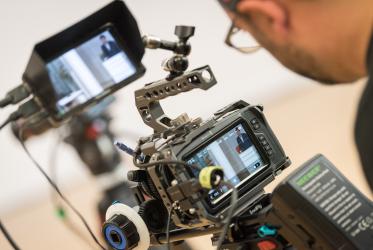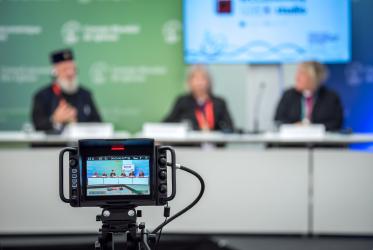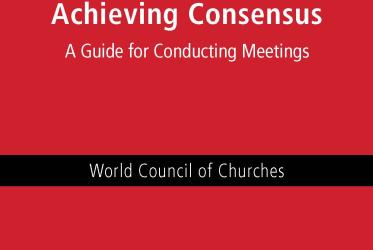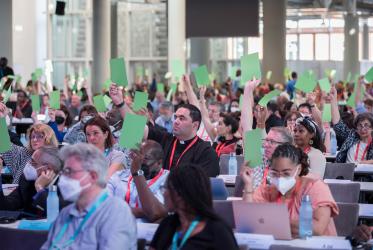Introduction
1. The Assembly Planning Committee (APC) met in Porto Alegre from 9-14 November 2004. In addition to their discussions about the Assembly programme the committee met with representatives of the Local and National Committees, visited the Assembly site (the Catholic Pontifical University - PUC) and met with the Assembly Worship Committee (AWC) to consider the recommendations from their meeting (5-9 November). Thanks were expressed to the staff group for the preparatory work that enabled the APC to consider the matters requiring discussion.
Local and National Committees
2. The APC was encouraged by the enthusiasm and commitment of the local churches - evident both in a joyful act of celebration at the Central Methodist Church, to mark the coming of the Assembly, and at the meeting with representatives of the Local and National Committees, which was addressed by the General Secretary. A range of matters were considered at the meeting, expectations and hopes were shared, and particular issues were identified that would require follow-up by the Coordination Team. The APC especially appreciated the work of Rev. Rui Bernard, the Porto Alegre-based coordinator, whose experience and contacts are invaluable.
Visit to the Pontifical University (PUC), logistics, etc.
3. The APC was impressed by the facilities and infrastructure available at the Assembly venue, which is compact, well equipped and congenial. The PUC has considerable experience in hosting major events, including the World Social Forum. The APC is confident that all logistical and practical requirements will be met. The plenary hall will accommodate all "core participants", seated at tables.[1] It will also accommodate 1,000 other participants with overflow accommodation nearby. The rooms for the other activities are located conveniently between the worship tent and the plenary hall; and there is space for press facilities and staff offices near the plenary hall. Technical support and computer facilities are available. The restaurants and cafés on the campus can seat 1,500 at once (buffet style). Delegates and other registered participants will stay in downtown hotels and will be transported by bus to and from the site morning and evening - each way is a 15-20 minutes.
Members of the Assembly Coordination Team met for one week after the APC to review detailed arrangements with the university, tourist board, hotels, caterers, airport and other service providers.
Worship and prayer
4. At its meeting with the AWC, the APC agreed the committee's recommendations relating to - the framework for the opening worship; arrangements and guidelines for morning and evening prayer and other worship possibilities (eucharistic liturgies, confessional services, etc.); gathering of music and other liturgical material; and preparation of a worship resource book. Following a visit to the PUC, the APC endorsed the AWC's recommendation for the location and type of the worship tent.
Invitation and nomination of delegates
5. The APC noted the actions of the Executive Committee in February and September 2004 relating to the increase of delegates from 700 to 728 and the addition of a new category of Assembly participant - "Adviser to Delegation", who have the right to speak, but not to vote. The APC expressed concern at the failure of many churches to meet the delegate nomination deadline of 31 October 2004, and, reconfirming the need for the Central Committee to take action on the list of delegates (see Appendix 1), encouraged the Assembly Office to pursue the matter rigorously.
Finance
6. The APC noted the revised financial forecast (latest position shown in Appendix 5) showing a balanced result, and noted that significant work remained to be done both in raising funds and controlling expenditure.
Communications
7. The APC noted with approval, and offered advice on the proposals for Assembly resources. The APC emphasised the importance of effective, user-friendly communication with participants both prior to and during the Assembly. The APC responded positively to the Assembly logo, approved by the Officers in June 2004. It noted with approval the progress towards publication of the Bible Studies in May 2005. The APC underlined the significance of using technology creatively and developing good media relations to secure advance promotion and good coverage of the Assembly. The APC advised that the post-Assembly report should be produced in book form, in English, with an accompanying CD in other languages. The APC underlined the importance of delegates receiving material to assist in sharing their experience and the Assembly Message at home, most likely in CD or video, at the end of the Assembly.
8. The APC offered comments on a draft Assembly language policy, recognising the sensitivity and complexity of the matter. It was noted inter alia that it is intended to provide simultaneous interpretation for plenary events to and from English, French, Indonesian, Spanish and Portuguese, and to confirm the need for German and Russian. Interpretation in other venues would be based on programme needs and technical factors. Assembly resources and documents will be produced in English. Translation into other languages is based on clear criteria and consultation with churches.
Preparation of delegates
9. The APC approved in principle
a) Pre-Assembly events to be held at the PUC and lasting 2-3 days at most, for young people, women and members of EDAN, the detailed arrangements for which would be developed by WCC staff in conjunction with the Local Committee;
b) Orientation session on the morning of Tuesday, 14 February to prepare delegates with information about the agenda, Assembly procedures (including consensus decision-making) practical arrangements and to provide training and information for those leading Bible Studies and offering leadership to committees.
Timetable and programme
10. The APC spent the majority of its time developing the timetable and programme for the Assembly, taking into particular account the Executive Committee's request that the Assembly programme be "lightened". Appendix 3 shows the programme that the APC now recommends for approval by the Central Committee.
11. The timetable and programme reflect the following principles and considerations:
v The twin objectives of achieving
1) a balance of prayer, fellowship, deliberation and business, and
2) a "flow" through the different stages of the Assembly programme.
v The need to ensure an adequate opportunity for delegates
1) to share insights and experiences of their churches,
2) to reflect on the work of the WCC since Harare, and
3) to shape the future direction and programmes of the WCC.
v The need to reflect the Latin American context and provide opportunity for engagement and encounter with the Brazilian and Latin American churches.
v The importance of securing the active involvement of young people in the Assembly.
v The limitations imposed by a shorter period than previous Assemblies and the need to contend with the heat that will be encountered in February.
12. Bible Studies. Following morning prayer it is proposed that core participants will meet for Bible Studies in groups of 15 persons, with a range of language groups. The Bible Study material will reflect a different aspect of the Assembly theme each day - God, in your grace, transform the world the earth our societies our churches our life our witness.
13. Plenaries
a) Opening events: in view of the desire enable local church members to attend, it is proposed to hold the opening worship at 18:00 on 14 February. The opening plenary (welcome, roll-call, etc.) will take place immediately beforehand. In two plenary sessions on the following day the APC recommends that the Moderator's address offer a significant reflection on the Assembly theme and that the General Secretary's report focus on the activities of the WCC since the last Assembly. There will be a brief opportunity after each address for comments.
b) Thematic plenaries: six thematic plenaries are proposed, focusing on Economic Injustice (emphasis on viable alternatives); Religious Plurality (Christian witness in secular societies and among other faiths); Church Unity (including the study on unity and reflection on the future of the ecumenical movement); Latin America (to be arranged in conjunction with regional and national organisations); Overcoming Violence (mid-decade); and the Assembly Theme (a panel reflection towards the end of the Assembly on insights, experiences and impressions gained during the Assembly). The APC recommends that the methodology and approach of the thematic plenaries be varied, i.e. - not too many speakers; speakers from many backgrounds, including Latin America contributions and young people; a balance of gender, regional and church perspectives; use of audio-visual resources; and concluding with both a note of challenge and prayer.
14. Ecumenical Conversations. As a means of sharing insights and concerns, relating both to the life of member churches and to WCC activities, the APC proposes to arrange "ecumenical conversations" on issues of critical significance to the ecumenical movement. The conversations will offer a meaningful presentation of the issues, encourage an exchange of experiences and identify emerging concerns and directions. The fruits of these discussions will feed directly into the work of the Programme Guidelines Committee through its members acting as "listners" in each conversation.
15. As regards the format, methodology and content of the Ecumenical Conversations, the APC proposes that
a) Ecumenical Conversations be open only to core participants and registered youth.
b) The topics of the conversations be grouped under four themes:
v The changing religious and cultural landscape
v The changing ecumenical landscape
v The changing international and political context
v The changing social and economic context;
Each broad theme will comprise five topics, i.e. 20 conversations in total.
c) Participants will sign up for one conversations and meet for three days addressing the issues from three angles:
v What is the present reality?
v What are our churches doing?
v Where do we go from here as a fellowship of churches seeking unity?
d) One third of the time will be used to introduce the issues, one third of the time to solicit contributions from delegates and one third of the time for open discussion.
e) Simultaneous interpretation should be available in up to 4 conversations.
f) The leadership team for each conversation should consist of :
v 2 co-moderators (one woman and one man, drawn from among delegates)
v 1 listener (drawn from delegates who are members of the Programme Guidelines Committee)
v 1 recording secretary
v 1 staff or co-opted staff
v 1 or more presenters to ensure different perspectives on issues are considered.
g) A brief record will be kept of each of conversation, to be consolidated under the broad themes (four documents in total). The document will be a resource for the new Central Committee and Staff following the Assembly (i.e. not for publication or distribution during the Assembly).
16. Mutirao (Ecumenical partnership/"visitors" programme). The APC consider it important that the Assembly be an inclusive event and recommends the adoption of the concept of Mutirao - a Portuguese word for gathering, celebrating, reflecting, sharing and working together. In developing Mutirao within the Assembly programme it is proposed that three basic activities should be offered - celebration, exhibition and reflection. Mutirao will include provision for what, at previous Assemblies, has been regarded as the programme for visitors and ecumenical partners. At this Assembly a more integrated process is intended, involving some activities in which delegates and others will share and other times when non-delegates will have a parallel programme of activities.
17. The following are proposed as the elements of Mutirao:
a) Bible study for Mutirao participants will follow the same scripture lesson and material as the core participants. Rather than meeting in small groups, participants will meet by language group (i.e. English, Spanish, Portugese).
b) During the thematic plenaries and decision plenaries, a significant number of Mutirao participants will be accommodated in the plenary hall. In addition, overflow spaces will be needed, according to language. The overflow spaces should be staffed with people who respond to question of process and content. During some decision plenaries, alternative offerings might be provided.
c) During the Ecumenical Conversations, ecumenical formation lectures will be offered, making use of the plenary hall and interpretation equipment.
d) A daily offering of celebrations, co-ordinated by the Local and National Committees, will be made, including music, dance, drama and other cultural activities.
e) An exhibition centre will enable member churches and ecumenical partners to present activities, productions and programmes and there will be opportunities for local and regional church-related groups to sell art and craft products. Means will be explored of ensuring that this provision is as inclusive as possible, not restricted to groups that are Latin American or from richer countries.
f) Each day between 10 and 15 workshops (oficinas in Portuguese) will be offered between 12.30 and 15.00. Offerings will be announced well in advance. The workshops will provide an opportunity for mutual sharing and learning. Oficinas will be prepared by Latin American and Caribbean churches, ecumenical partners and WCC staff teams (1/3 each).
g) Rooms will be provided for groups to meet and organise activities within the framework of ecumenical formation (for ecumenical agencies, groups, theological students, etc.)
18. The success of the Mutirao will depend on churches and ecumenical partners mobilising their resources effectively. The programme will be co-ordinated by the WCC staff team in Geneva in cooperation with the local, national and regional (Latin America) groups. Offerings must be recommended by a member church or church-related organisation. They should be related to the theme of the Assembly. They should be relevant and constructive contributions to the ecumenical movement. Final decisions will rest with the Assembly leadership.
19. Committees and decision sessions. The APC noted that the Executive Committee has decided that Assembly Committees should be similar in size (20-24 persons) and composition to the Executive Committee. The APC noted that the following committees will be established: Business, Nominations (both required by WCC Rules), Programme Guidelines, Policy Reference, Public Issues, Finance and Message. In addition the Assembly Worship Committee continues its work through the Assembly. The APC recommends that the committees meet during lunch and report in turn on the last four days of the Assembly. The adoption of the consensus decision-making procedures has implications for how committee reports are presented and the time necessary to adopt them.
Actions requested by the Central Committee
20. The Central Committee are invited to
a) Confirm the list of member church nominated delegates (85% of the total delegates) (Appendix 1);
b) Nominate additional delegates based on member church recommendations (15% of the total delegates) (Appendix 2);
c) Consider and approve the Assembly programme and timetable (Appendix 4);
d) Endorse the continuing development of Mutirao.
Appendices
Appendix 1 Delegates nominated by member churches for confirmation by the Central Committee (85% of the total delegates) - to be distributed in Geneva
Appendix 2 Delegates proposed by member churches for nomination by the Central Committee (15% of the total delegates) - to be distributed in Geneva
Appendix 3 Assembly Timetable
Appendix 4 Report of the Assembly Worship Committee
Appendix 5 Financial Forecast - to be distributed in Geneva
[1] Member and Associate Member Church Delegates, Delegated Representatives, Observers, Advisors and Guests.



